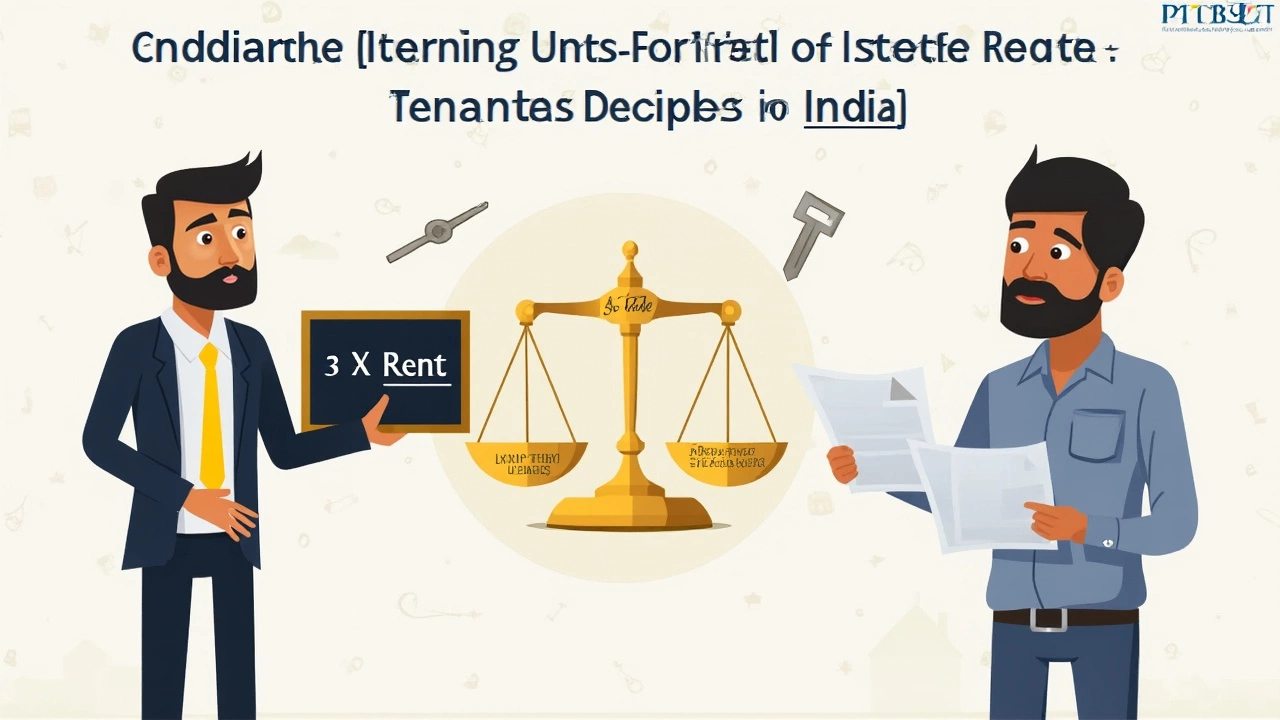Ever heard a landlord say you need to make three times the rent to get an apartment? If you’re apartment hunting in Virginia, you’ll see “3x rent” pop up all over listings. So, is that even allowed—or is it just some made-up hurdle?
Here’s the deal: There’s no Virginia law that tells landlords exactly how much income a renter needs, or bans the 3x rent rule. It’s not in the state code, and it’s not a secret loophole. That said, this rule can still trip you up if you don’t know your rights.
Landlords often use 3x rent to figure out if tenants can actually pay on time. It’s meant to protect their bottom line—but sometimes it knocks out really good applicants. If you’re nervous about qualifying, or wondering if you can push back, hang tight. There are ways to work with landlords or show you’re a reliable bet, even if you don’t hit that magic number.
Stick around as we get into why this standard exists, what the law actually says, and how to handle tricky situations without losing your cool.
- What Does 3x Rent Actually Mean?
- Is It Legal in Virginia?
- Why Landlords Use the 3x Rent Standard
- Red Flags and Fair Housing Risks
- Smart Moves for Renters and Landlords
What Does 3x Rent Actually Mean?
When a landlord asks for "3x rent", they want your monthly income to be at least three times the rent amount. It’s a super common rule you’ll see in rental applications, especially in Virginia, and it’s used to measure whether you can comfortably afford the place.
Let’s break it down. Say you’re eyeing an apartment for $1,500 a month. Landlords using the 3x rent rule want proof you make at least $4,500 each month before taxes. This number can include wages, some types of government support, or even regular child support in certain cases.
Usually, they’ll ask you to back this up with pay stubs, offer letters, or bank statements. If you’re self-employed, expect to show tax returns or invoices. The whole point is to lower their risk — statistically, tenants who spend more than a third of their income on rent are more likely to fall behind.
| Monthly Rent | Income Needed (3x Rent) |
|---|---|
| $1,000 | $3,000 |
| $1,200 | $3,600 |
| $1,500 | $4,500 |
| $2,000 | $6,000 |
Most landlords in Virginia aren’t checking your exact budget or spending habits — they’re looking for a quick, repeatable way to sort applications. Does it make sense for everyone? Nope. Some folks get by just fine spending more on rent, especially if they don’t have lots of other bills or debts. Some people have roommates or side hustles that help. But the 3x rent rule is mostly about reducing the odds of missed payments and keeping things simple for landlords juggling loads of renters.
Is It Legal in Virginia?
Let’s cut straight to it: In Virginia, there’s no law that blocks a landlord from using the 3x rent rule as an income requirement. The state doesn’t have anything written in its rental statutes that says, “Whoa, landlords, that’s too much,” or sets any exact income limits applicants must meet. Landlords can ask for 3x rent, 2.5x rent, or some other number—they get to decide what they feel comfortable with.
Here’s what you won’t find in the Virginia Residential Landlord and Tenant Act: any maximum or minimum for what a landlord can require when it comes to tenant income. That means landlords are free to set income guidelines like “must show proof of 3x rent.” This isn’t just in Virginia, by the way—it’s standard in a lot of states, especially where there’s no rent control.
But there is a boundary they can’t cross: no matter what income standard they set, landlords must apply it fairly to every applicant. If a landlord says everybody must earn three times the rent, they can’t pick and choose when to ignore that based on who’s applying. That’s where fair housing laws kick in, banning discrimination by things like race, religion, disability, family status, and more.
- If you’re asked for 3x rent, it’s legal—but it should be the same rule for everyone.
- No extra or “just for you” requirements based on protected categories. That’s a violation.
For a sense of how common these requirements are, check out this data from a 2023 regional survey:
| Income Requirement | % of Listings (Richmond, VA) |
|---|---|
| 3x Rent | 78% |
| 2.5x Rent | 15% |
| No Income Requirement | 7% |
So when you see a “must make 3x rent” clause, know that landlords are usually in the clear—unless they’re being shady and using it to discriminate. If something feels off, or a landlord changes the goalposts after meeting you, keep all your emails. You might have a case with the Virginia Fair Housing Office if that happens.

Why Landlords Use the 3x Rent Standard
If you’re renting in Virginia, you’ve probably wondered why the 3x rent rule is such a big deal with landlords. It isn’t just a random number they pull out of thin air. Most landlords set this bar to lower the risk of missed rent payments and expensive evictions down the road.
Here’s how it breaks down: By asking renters to prove they earn at least three times the monthly rent, landlords try to make sure you aren’t “rent-burdened.” This means your rent shouldn’t eat up more than a third of your income. According to the U.S. Department of Housing and Urban Development, someone is considered cost-burdened if they spend more than 30% of their income on housing. That’s really where the 3x rule comes from—lining up with what federal housing experts see as sustainable.
According to the National Multifamily Housing Council, “Income requirements, like the 3x rent rule, are used by property managers to help both renters and owners manage expectations and avoid unaffordable leases.”
For a landlord, this standard isn’t just about being strict. It cuts down on late rent drama, missed payments, and legal headaches. Evictions are costly—a study from the Virginia Poverty Law Center found average legal costs and lost rent can easily hit over $2,000 per eviction. That’s why most landlords want solid Virginia rent requirements upfront.
Some property management companies use software to check income automatically. Others just want pay stubs or bank statements. It’s rarely personal—it’s about checking a box and dodging problems later.
Here’s what the 3x rent standard boils down to for renters:
- Less risk of getting stretched too thin every month
- A better shot at stable, long-term housing
- Quicker application—landlords can approve fast if you hit the target
And for landlords:
- Lower odds of missed payments or evictions
- Consistent way to screen applicants
- Helps explain rejections if there’s ever a dispute
| Monthly Rent | Required Monthly Income (3x rule) |
|---|---|
| $1,200 | $3,600 |
| $1,500 | $4,500 |
| $2,000 | $6,000 |
Bottom line? The standard might feel tough when your budget is tight, but it’s supposed to protect both sides from nasty surprises later.
Red Flags and Fair Housing Risks
Setting a “3x rent rule” might seem like just a math thing, but in Virginia—and anywhere in the U.S.—there’s a bigger picture to consider. Landlords must follow the Fair Housing Act, which bans discrimination based on race, color, religion, sex, disability, family status, and national origin. Virginia adds protections for things like sexual orientation, gender identity, and veteran status. If a landlord hides behind the 3x rule but actually uses it to weed out people from certain backgrounds, that’s a real problem.
Sometimes the way this rule is applied can be shady. If landlords give extra hoops to jump through only to certain groups, or turn down applicants who use Social Security or housing vouchers (like Section 8) as income, that’s called “disparate impact.” Fair housing investigators look closely at trends like these. For example, if almost every applicant getting denied for not meeting the 3x rent rule is from the same protected group, that can bring legal trouble.
To make it clearer, check out a few bad moves landlords should avoid:
- Refusing to count child support, disability payments, or legal housing assistance toward income.
- Applying the 3x rent rule inconsistently—stricter with certain names, accents, or family sizes.
- Automatically excluding every applicant who uses a voucher, even though Virginia says you can’t discriminate based on "source of funds."
If you ever hit a wall and it feels unfair—like you’re being blocked by the 3x rent rule for reasons that don’t really have anything to do with money—you can file a complaint with the Virginia Fair Housing Office or even HUD. They investigate these things, and plenty of renters have won.
Here’s a quick look at some protected classes in Virginia:
| Protected Status | Covers |
|---|---|
| Race/Color | All ethnic groups |
| National Origin | Country of birth/ancestry |
| Religion | Beliefs and practices |
| Sex & Gender | Includes sexual orientation, identity |
| Disability Status | Physical or mental challenges |
| Family Status | Children, pregnancy, etc. |
| Source of Funds | Housing vouchers, SSI, etc. |
Bottom line: The 3x rent rule in Virginia is legal, but it has to be used fairly. If landlords use it to hide discrimination, they’re playing with fire. Renters should know their rights, and never be afraid to ask questions or call out something that doesn’t feel right.

Smart Moves for Renters and Landlords
Getting your head around the 3x rent rule in Virginia can save both renters and landlords from a lot of drama. While it’s not illegal for a landlord to ask for it, there’s no rule saying how you go about things, either. Here are some tips that actually work in the real world:
- Show Proof Beyond Income: Don’t hit the 3x mark? Bring in bank statements, offer letters, or show you’ve always paid rent on time. Landlords like any sign that money isn’t going to be an issue.
- Offer a Co-Signer: If your income’s low but steady, a parent or friend can co-sign. Many Virginia landlords will accept this. The key is, can someone else guarantee you won’t miss the rent?
- Ask About Lease Adjustments: Some owners will let you pay extra months up front, or offer a slightly higher deposit, if you’re close but not quite there. Don’t be afraid to ask—especially if you have a strong rental history.
- Double-Check Fair Housing Laws: If someone asks personal questions (about race, disability, family status, etc.), that’s not just awkward—it’s illegal. Landlords should focus only on financial stuff, not anything that feels off.
- Document Everything: Renters should save emails and texts about the application process. Landlords should keep application notes in writing, just in case a dispute pops up. Good records keep everyone honest.
For landlords using a 3x rent rule, here’s a quick breakdown of how the numbers shake out for popular rent ranges in Virginia:
| Monthly Rent | Income Needed (3x Rent) |
|---|---|
| $1,200 | $3,600/mo ($43,200/year) |
| $1,500 | $4,500/mo ($54,000/year) |
| $2,000 | $6,000/mo ($72,000/year) |
One more thing: ask up front about application fees and screening costs. In Virginia, these are capped at $50 for each applicant—it’s the law. Don’t let anyone charge you more, or tack on weird “processing” fees.
Whether you’re a renter or landlord, knowing your numbers and rights makes it way easier to skip the stress and land a solid rental deal in Virginia. Think ahead, ask questions, and don’t be shy about protecting your side of the rental game.

